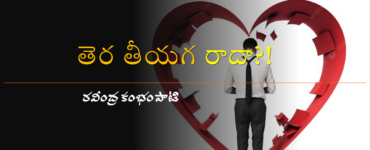Kalateeta Vyaktulu, People Who Live Beyond Time, Dr. P. Sridevi: Visalandhra Publishing House, Hyderabad; Price Rs 100; pages 225; 2013
There are few books that once read, makes their mark on the reader’s mind and whenever you go back to them, you experience the same sense of satisfaction and nostalgia. Age is an important factor when one is reading–if you read a book when you are twenty, and then again when you are sixty or seventy the perspectives are not the same but the intensity of the appeal does not change. One wonders what and how we define timelessness. Is it the book or the characters who live on even after more than half a century of its first publication or the issues discussed and debated that make this book ageless?
First published in 1958, Kalateeta Vyaktulu was reprinted six times and this is the seventh edition published on the occasion of Visalandhra’s diamond jubilee celebration. The writer Dr P Sridevi was the daughter of the illustrious and well-known playwright, writer and nationalist, Dr Gullapalli Narayana Murthy. She was born in Anakapalli on 21st September 1929. She was educated in Kakinada and Visakhapatnam. A full-time doctor by profession, she was also a part-time writer of short fiction, a lyricist and a literary critic. In her short life she rose to be a shining star with her one novel Kalateeeta Vyaktulu. She died on 29th July 1961 at the age of thirty-two.
This particular edition of the book comes with the introduction by Etukuri Prasad and foreward by P. Sarala Devi. There is also an analysis of the book by Dr. V. Chandrasekhar Rao at the back end of the volume along with an elegiac poem as a beautiful tribute to Dr. Sridevi penned by Dr, Nayani Krishna Kumari. It is an altogether beautiful edition, which is a good reminder to Telugu readers about the unforgettable writers of this rich vernacular’s history.
After this re-reading of the book, there was a total silence in the mind, a strong urge to be with the self, live with the book in my memory for at least twenty-four hours without saying anything, hoping that this meditative silence will crystallise the thoughts on this novel.
Here is what followed this contemplation: Written in the early 50s, the first thing that comes to mind about this book is that it could have been written even today- seemingly woman centric, gender-sensitive and with very contemporary issues of conflict between traditions and modernity. The necessity of women to go into the world unprotected, the dangers that threaten their existence and the adjustments that women make to prove themselves against all odds- aren’t these issues challenging women even today?
The story centres around three women. Two of them, Indira and Kalyani sailing in the same economic and social boats on the turbulent waters of survival. The third one is Vasundhara economically well-off but constrained by family to manage her life, on constant watch by a care giver aunt (pinni) and an absentee brother who occasionally appears to monitor her life.
Indira and Prakasam, in the beginning of the story, appear as co-tenants. Indira, quite unlike the women of her time, is educated enough to obtain a job which helps her to meet the basic needs of life while supporting her dependent father. Like many other women she had dreams of a comfortable life with a good family and stability in her heart of hearts. Ananda Rao, her father, spends most of his time playing cards, sleeping and occasionally drinking. He never shows any inclination to care for or help Indira, but on the positive side, he also never questions her, controls her or advises her on anything. Indira takes good care of him but he never shows any affection to her. They understand each other perfectly and never come in each other’s way. When Indira is not in office, she spends her time shuttling between her part of the rented house and Prakasam’s room upstairs. She takes all kinds of liberties with him, orders him around and chats with him till midnight. He is her only diversion in life. When the novel starts Prakasam is a serious student of medicine. Gradually he gets dragged into a friendship with Indira, though he occasionally resents her interference. He came from a village to study medicine with the help of his maternal uncle who decides to take care of his nephew and his widowed sister. She inherits a piece of land and that was what motivates him to care for the nephew. Prakasam feels indebted as well trapped by this domineering uncle. Indira constantly tries to provoke him into asserting his independence.
Into their life comes Kalyani, Indira’s friend. Initially Indira offers the room to her as it could fetch some extra money as rent. Kalyani is mild mannered sensitive and sensible in many aspects of life. They get along well till Indira starts resenting the attention Prakasam gives to Kalyani. She starts resenting Kalyani’s presence too. She gets closer to Prakasam, when he gives attention to Kalyani. On the other hand, Prakasam’s friend Krishnamurthy is attracted towards Indira. He is the fourth important character in the novel. When Kalyani’s father falls ill, Prakasam helps Kalyani to go to her village assuring her of his help throughout their life. Then Indira’s insecurity as well as her scheming nature gets revealed when she stops Prakasam’s letters from reaching Kalyani and hides Kalyani’s letters that mention her helpless, homeless plight and the news of her father’s death. Prakasam gets worried and shares his concern with Krishnamurthy who is a frequent visitor to his room. Indira when she thinks that Prakasam is moving away from her starts using Krishnamurthy for all her petty needs. Ananda Rao assists Indira by hiding this knowledge from both Prakasam and Krishnamurthy. Kalyani comes back to town and on the invitation of Vasundhara, a fellow student from her school, moves to her house, feeling rejected by Indira. Indira was happy and she gets back to Prakasam. Kalyani in her sadness becomes more and more introvert and keeps herself devoted to her studies and to Vasundhara’s friendship. But Krishnamurthy manages to get in touch with her and understands the games played by Indira and Ananda Rao to separate Prakasam and Kalyani. They successfully manage to hoodwink Kalyani into believing that Prakasam was not very reliable. Prakasam falls into his uncle’s trap when he goes home and gets drawn into a marriage proposal. At one point he escapes and comes back, but noticing the change in Indira’s behaviour, he decides to go back and settle with the match his uncle had planned and comes to terms with his life.
Krishnamurthy brings another friend of his, Dr, Chakravathy, into Kalyani’s life when Kalyani’s well-wisher Rami Naidu was unwell in her house. Chakravarthy develops admiration for the simple and sincere nature of Kalyani. When Vasundhara’s care giver tries to send Kalyani away from the house Kalyani independently goes searching for a room and starts earning by giving private tuitions to children. The money that she gets after disposing of her house in the village and after clearing the debts helps to bring her life into her control. The village munsif also helps her in this. Once, when she goes to visit Vasundhara, she was insulted by the aunt and she comes to Chakravarthy and breaks down in his presence. Krishnamurthy meets Indira while coming to meet Chakravathy. Indira drags him home and with her extra attention and care successfully manages to keep him there for the night. He spends a romantic night with her and then Indira reveals her other side. So far, the people around her see her frivolous and fickle-minded nature. In the story that Indira reveals about her life, she comes out as a motherless child with a largely insecure childhood due to an irresponsible father. He turns into a cynical man after life gives him a raw deal when he is jailed after a fight. He never picks up the threads after coming out of jail as he did not get suitable employment due to his record. Now he was trapped again in a smuggling racket and is arrested. Indira faces life alone, still trying to chase her dreams and that story moves Krishnamurthy and he starts seeing her in a new light. They get close. The sense of self- examination and innate values that Krishnamurthy possesses help him to come to realise that he can live happily with a girl like Indira rather than Vasundhara. He goes to his village to contemplate and comes back and proposes to Indira. Her eyes open to the inner worth of Krishnamurthy and she comes to see the confidence with which he proposes to her and she always wanted that confidence from someone in life. Because she really believes what she once tells him, ‘If you live like an insect people will stamp on you like an insect.’ She has seen that people who live by the rules are always oppressed. You need a lot of money, status and other things to live like that. If you have a lot then you can live by the rules. One can even get away by going against the rules. Now feudal lords have gone but feudalism lives on.’ One should live one day at a time and face all the situations head on as and when they come. She tells him not to boss over her by taking her for granted as she can run away from such situations. The tough postures she presents have a deep maturity and rationale of their own. Kalyani, mild mannered as always, decides to marry Chakravarthy but throughout, in her heart of hearts, she was not confident about her luck. Though she loves, him she afraid to say it loudly, not entirely confident that her happiness would last.
Vasundhara attends these marriages in good spirit and the story comes to a logical conclusion. She forgives Krishnamurthy for ‘rejecting’ her.
Indira comes out as a winner, as expected, but after a long struggle with herself, her life, her circumstances, and with the society around her. Whatever she wanted she had to grab for herself, upsetting relationships on the way, especially her friendship with Kalyani.
The story appears cynical, both Indira and Kalyani with their differing attitudes and perceptions refuse to see the brighter side of life. They do not act or do anything to bring any change in their circumstances, but all is well that ends well. Upward mobility was not an option either for Indira or Kalyani, as both of them seem to have achieved satisfaction with getting ‘right choices’ in their partners. The novel which started as women centric in the end gets its rational end by the innate values and mature decisions of the two male characters Chakravarty and Krishnamurthy.
*









Add comment